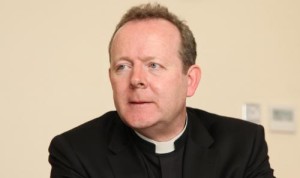
By Sarah Mac Donald - 21 March, 2016

At the annual Mass for the Disappeared in Armagh on Sunday, the Primate of All Ireland pleaded once again with those who have any information on the Disappeared to come forward to the Independent Commission for the Location of Victims’ Remains.
In his homily in St Patrick’s College, Archbishop Eamon Martin recalled the pain of the families of those abducted, murdered and secretly buried over the past seventeen years and the comfort they have given one another as a close bond of empathy developed among them.
He said it was “particularly merciful” that many of those who already have had the comfort of bringing home the bodies of their loved ones for burial, continue to gather in support of the remaining families, who still wait in hope.
Referring to the recovery and “dignified laying to rest” of Kevin McKee and Seamus Wright over the past twelve months, the Archbishop of Armagh said it encouraged all to continue to pray and not lose hope.
Appealing to the conscience of anyone who has information that might help find the remaining Disappeared, he urged them to approach the Independent Commission for the Location of Victims’ Remains, so that “even at this late stage, the remaining families can experience the consolation of being able to offer a Christian burial to their loved ones”.
He underlined that those with information are assured that it can only be used to recover the bodies of the Disappeared.
“This annual Mass for the Disappeared here in St Patrick’s College is a work of mercy. By our presence and our prayers we offer compassion and solidarity to those who continue to relive the shock and trauma of their loved one’s disappearance,” Archbishop Martin said.
Reminding the congregation that ‘burying the dead’ is among the corporal works of mercy he expressed gratitude that in Ireland still there is a “rich and meaningful tradition of honouring our dead”.
This included the wake, the removal, prayers with the family and friends, the Requiem Mass and funeral rites, incensing the coffin and “sprinkling the body of our loved one with Holy Water, the simple but dignified burial ceremony at the graveside, prayers (eg a decade of the Rosary) to Mary for those who mourn, a handshake and whispered ‘I’m sorry for your trouble’ to the nearest and dearest”.
Afterwards many families prepare memorial prayer cards and there is a strong tradition in Ireland of honouring the place of burial, making regular visits, placing flowers, sharing memories, praying for the dead and for those who mourn, gathering with others on each Cemetery Sunday, having November prayers for the Holy Souls, having the Month’s Mind and thereafter anniversary Masses.
“We do so knowing that praying for the dead, burying the dead and comforting the sorrowful are works of mercy; these are meaningful ways of reaching out to those who need us and letting them know that they are not forgotten,” he said.
Funeral rites and traditional customs and rituals are a tremendous comfort to the bereaved, and even though they do not bring our loved ones back, they help us to move emotionally to another space; they are such an important part of the bereavement process which can take many months or years.
The Primate of All Ireland also emphasised the teaching of the Catechism of the Catholic Church which states, ‘The bodies of the dead must be treated with respect and charity, in faith and hope of the Resurrection. The burial of the dead is a corporal work of mercy; it honours the children of God, who are temples of the Holy Spirit’.